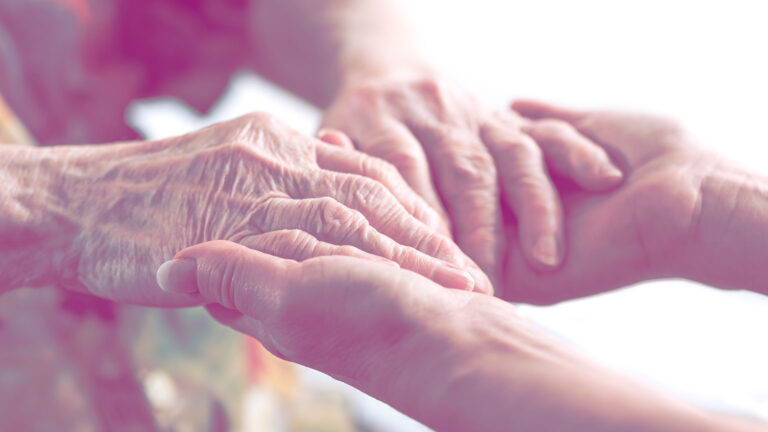Accompanying someone to the point of death is a remarkable experience. Nonetheless, you may find the anticipation emotionally and mentally exhausting. At times fervently wishing for it to be over. And then you can feel guilty for thinking like this. But it is a normal and understandable response to a very stressful situation.
Remember: Hearing may be present until the end, so never assume the person is unable to hear you.
- Talk as if they can hear you, even if they appear to be unconscious or restless.
- If possible lower lighting until it is soft, or light candles, making sure they burn in a safe place. Try to keep bright sunlight away from their face and eyes.
- You can create a peaceful, soothing atmosphere by playing a favourite piece of music or songs softly in the background.
- You might wish quietly to read a favourite poem, or a spiritual passage or religious text that means something to them.
- Strong physical contact can be painful or invasive. Often it is best to sit beside the bed and gently hold their hand.
- If appropriate arrange for end-of-life prayers to be said by a chaplain, vicar or priest, or by other faith ministers.
The Use of Gentle Touch
Gentle touch can provide comfort for the dying, and help communication on a deeper level. Even when a person is unconscious or semi-conscious, they might be able to respond with faint pressure from their thumb, or for example, twitch a toe. A light massage using aromatherapy oils such as rose, geranium, or lavender can soothe and reduce discomfort and distress. Those who are dying can also find gentle hand and foot massage relaxing and calming.
The dying choose their moment to go
More than we realise, people appear to choose the moment to die. They seem to know who is strong enough to face the moment with them, and to protect those who aren’t.
It is not unusual for someone to hang on to life against medical odds until a relative or friend arrives at their bedside, or until a special anniversary or birthday. As mentioned before, a person who is confused, semi-conscious or unconscious may become lucid enough to be able to say a final goodbye before dying.
Some relatives may feel compelled to visit the dying person in the middle of the night, or experience being ‘called’ back to the bedside from, for example, a coffee break, just in time to be with them as they die.
In contrast, some people seem to make a deliberate choice to die alone. We have collected many stories of the dying who appear to wait until everyone has left the room—even for the shortest time—before they die.
We have also heard accounts of the dying seeming to choose to die with only particular people in the room.
It can be difficult if someone dies just as you have taken a break from being with them for many hours or even days. You may feel hurt that they haven’t ‘chosen’ to be with you at the moment of death. Or you feel guilty for believing you have let the person down by missing the crucial moment.
It may help to know that sometimes a person needs emotional freedom to die in peace on their own, or, perhaps because emotions are running high, they choose to die in the presence of other relatives or friends who are more able to cope with it.
What should I do if I can’t be there?
When it’s not possible to spend time with the dying person, you can still feel connected to them.Memories of someone who is dying or has died are often bitter-sweet. Reminiscences become part of who you are. It’s important to find something that helps you achieve a sense of completion. You might, for instance, want to create a special space where you can light a candle and say prayers—or whatever you need to do—to say goodbye.
Perhaps write them a letter expressing the things you wanted to say but never did. If they have already died, you might want ceremonially to burn the letter or bury it. Maybe you need to go into nature to say your farewells, or to buy a special tree or flower and plant it in their memory.
Funerals are of course central to the grieving process. They allow us to share our grief and to take part in an established social and personal ritual of saying goodbye, surrounded by others who also knew and loved the person.
If you find you are struggling with your grief, or holding onto unresolved feelings for this person, do consider talking to a bereavement counsellor.
Thank you for visiting this page. You may be interested in my books on death and dying. You can also listen to a host of fascinating guests on my Embracing Your Mortality podcast.
















